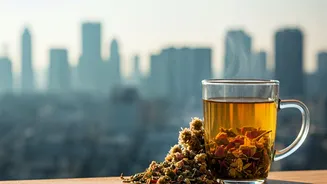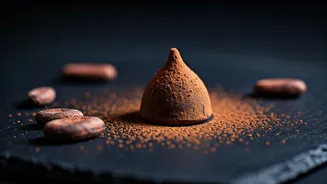Pollution's Impact on Health
Air pollution poses serious health risks, particularly during peak seasons. Fine particulate matter, harmful gases, and various pollutants can infiltrate
the respiratory system, leading to inflammation and various respiratory problems. Chronic exposure can exacerbate existing conditions like asthma and increase susceptibility to other illnesses. Traditional chai, often prepared with milk and sugar, might not offer much in terms of protective qualities, and the added sugars could indirectly affect health. Conversely, herbal teas offer a more direct path to health benefits, with specific herbs known for their antioxidant and anti-inflammatory properties that can actively counteract the adverse effects of pollutants. This proactive approach supports a stronger immune response, helping the body to better defend itself against the daily assault of harmful environmental factors. It's a proactive measure that complements lifestyle choices by focusing on internal support during periods of heightened environmental risks.
Herbal Tea's Protective Power
Certain herbal teas are naturally equipped to combat pollution's adverse impacts, offering significant health advantages. Tulsi, also known as holy basil, is praised for its ability to reduce inflammation and boost the immune system. It aids the body in neutralizing free radicals caused by pollution. Ginger tea possesses anti-inflammatory and antioxidant properties, helping to soothe respiratory passages irritated by pollutants. Turmeric tea, with its active ingredient curcumin, is effective in decreasing inflammation and providing overall health advantages. Chamomile tea, famous for its soothing qualities, can reduce stress and inflammation, assisting in the body's natural healing process. Peppermint tea clears nasal passages and boosts respiratory function. Each tea offers unique properties that aid in minimizing the health effects of air pollution, making them valuable additions to your daily routine, especially during times of compromised air quality. These choices offer a gentle yet powerful approach to safeguarding your health.
Chai vs. Herbal Tea
Comparing chai to herbal teas reveals significant differences in their health benefits. Chai, typically involving milk and sugar, lacks the specific properties that directly combat pollution. Its rich preparation may contribute to inflammation and lack the protective ingredients necessary to mitigate the risks associated with polluted air. Herbal teas, on the other hand, are designed with the health of the lungs and immune system in mind. They provide a range of antioxidants and anti-inflammatory compounds that directly work against pollution’s effects. The key lies in the ingredients: herbal teas carefully select components known for their medicinal benefits, whereas chai focuses more on flavor and comfort. When choosing a beverage during pollution season, herbal teas present a strategic advantage, giving your body the tools it needs to defend itself against environmental stressors. This active approach promotes better breathing and more robust overall health.
Selecting the Best Tea
Choosing the ideal herbal tea requires considering the specific needs and preferences of each individual. For respiratory support, tulsi tea is an excellent choice due to its anti-inflammatory effects. Ginger tea can relieve throat discomfort and reduce inflammation. If relaxation is prioritized, chamomile tea is suitable for soothing the nervous system, helping to manage stress during periods of poor air quality. Those seeking a broader range of advantages may choose turmeric tea because it offers strong anti-inflammatory properties, benefiting overall health. It's important to experiment with different tea types to discover which ones suit personal taste and deliver the desired health benefits. Ensure the teas are sourced from reputable suppliers to guarantee high-quality ingredients. Making herbal tea a regular part of your daily ritual during pollution season offers a natural and effective way to protect your well-being.
Making Tea Effectively
Preparing herbal tea to maximize its health benefits involves careful attention to the brewing process. Start by using high-quality, fresh water. Bring the water to a boil, then reduce the heat to prevent over-extraction, which might result in a bitter taste. For most teas, steep the herbs for 5-7 minutes, enabling the beneficial compounds to be released. Use a tea infuser or a tea bag for loose leaf herbs to make removal simple. Adjust the steeping time based on the particular herb. For teas that can be bitter, steeping them for a shorter time will work. Avoid adding excessive amounts of sugar or milk, as these may diminish the health benefits. To sweeten, consider using honey or a small amount of jaggery, which may reduce some negative effects. Sipping herbal tea mindfully adds to its therapeutic value, enhancing the experience and maximizing its effectiveness during pollution season. Careful preparation ensures you get the most out of each cup.













